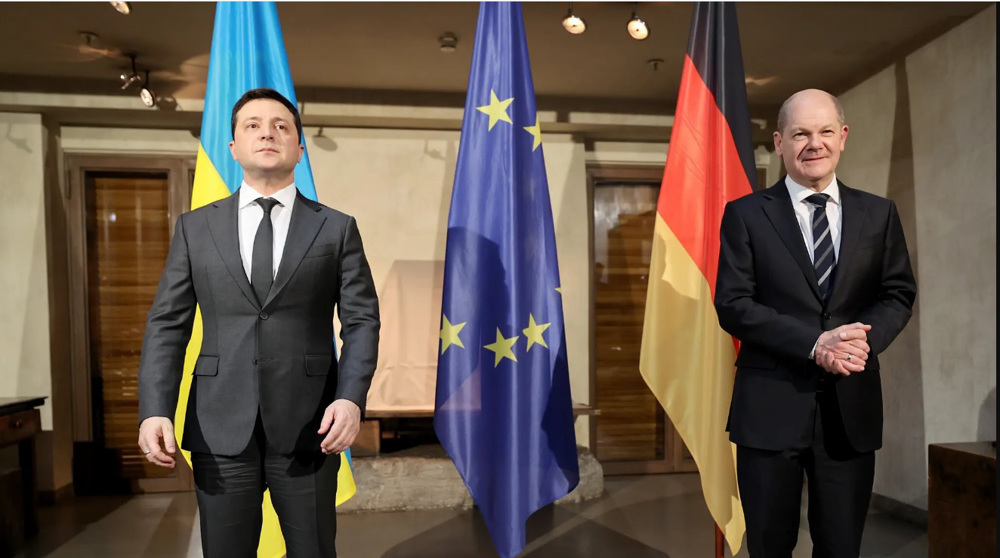
FULL DISCLOSURE: Sourced from Iranian State-Controlled Media
EU mulls ban on imports of Russian oil, but divisions abound
First published 11 April 2022, Press TV Iran
The European Union is drafting proposals to impose a ban on the import of Russian oil, the top diplomats of Ireland, Lithuania, and the Netherlands said Monday, despite a lack of consensus on the issue between member nations.
“The European Union is spending hundreds of millions of euros on importing oil from Russia, that is certainly contributing to financing this war. We need to cut off that financing … the sooner that can happen the better,” Irish Foreign Minister Simon Coveney said on Monday.
“They are now working on ensuring that oil is part of the next sanctions package,” Coveney further added as he arrived for a meeting with his EU counterparts in Luxembourg, referring to the European Commission.
His Dutch and Lithuanian counterparts also stated they were open to looking at ways at targeting Russian oil, which accounts for nearly a quarter of the EU’s crude imports, as yet another supposed measure to force Russia to halt its military operation in Ukraine.
“We are looking at all other (sanctions), including energy,” Dutch Foreign Minister Wopke Hoekstra underlined, echoing a position held by EU Foreign Policy Chief Josep Borrell, who has said an EU oil embargo must happen “sooner or later.”
The development comes after the European Parliament voted last week for the anti-Russia ban, although its decision is not binding.
Any oil embargo rests on both the technical details of the scope and phase-in time of such a move and the support of the EU’s 27 member states, according to media reports.
Energy dependence varies widely across the bloc, with countries such as Bulgaria almost totally dependent on Russian oil. This is while Hungary has already declared it cannot support an oil embargo.
The bloc last week approved the fifth round of sanctions on Russia that included an end to Russian coal imports following repeated allegations by Ukraine that Russian forces are targeting non-military targets.
Russia, however, has denied targeting civilians in what it calls a “special operation” to demilitarize and “denazify” its southern neighbor.
Moreover, European Commission President Ursula von der Leyen also announced last week that she was considering additional sanctions, including oil imports, based in part on proposals from EU governments.
Those ideas include imposing tariffs on Russian oil, or a ban on some oil products, according to EU diplomats.
Germany’s position, as the EU’s biggest economy, is viewed as crucial. Its Foreign Minister Annalena Baerbock called for a “coordinated plan to completely phase out fossil fuels” from Russia, as she arrived in Luxembourg.
However, EU diplomats have said Berlin is not actively supporting an embargo for the time being.
The development came a day after Ukrainian President Volodymyr Zelensky claimed that he has discussed possible additional sanctions on Russia and support for Kiev in a call with German Chancellor Olaf Scholz.
Photo: Zelensky and Scholz
In a tweet on Sunday, Zelensky called for punitive measures against Russia, saying he and Scholz discussed “anti-Russian sanctions, defense and financial support for Ukraine.”
However, a statement from Scholz’s office on the chancellor’s call with Zelensky did not mention a discussion of the sanctions.
Zelensky has urged an embargo on imported gas and oil from Russia, but Germany has so far resisted such measures.
Russian President Vladimir Putin announced a military operation against Ukraine on February 24, provoking a unanimous response from Western countries, which imposed a slew of sanctions on Moscow.
Russia says it will halt the operation only if Kiev meets its demands, including giving up the ambition of joining NATO.
Scholz said on Friday that Germany could end Russian oil imports this year but stopping gas imports would be tougher because the country would need to build infrastructure to import gas from alternative sources.
Russian oil accounts for 25 percent of German imports, down from 35 percent before the start of Russia’s military operation. Gas imports to Germany from Russia have been cut to 40 percent from 55 percent, and hard coal imports to 25 percent from 50 percent.
Source: Press TV Iran
ATTENTION READERS
We See The World From All Sides and Want YOU To Be Fully InformedIn fact, intentional disinformation is a disgraceful scourge in media today. So to assuage any possible errant incorrect information posted herein, we strongly encourage you to seek corroboration from other non-VT sources before forming an educated opinion.
About VT - Policies & Disclosures - Comment Policy





In Italy it’s now: Aircondition & peace, so I suggest:
GAS & PEACE !
That means Russia can ship more oil to China while the EU commits political suicide. 🤣 These people are stupid🤣
it’s an asymetric war, Iran, China, Russia are fighting for their people, but the western ‘private public partnership’ is fighting against people. So even western people would be better off with a chinese regime.
About the photo Nazilensky and Scholz I was thinking that Scholz grandfather surely has to be very proud if he could see him…..I mean because Fritz von Scholz was a high-ranking member of the Waffen-SS…. 🙂
LOL and Thank You.
I guess the eu and others are going to throw the citizens out into the cold. It’s what we do in Amerika.
Nazilensky. Good one. Genetically linked to Zuckerface. Balls of an elephant and the brain of a mouse traits. But it works.
bingo !
https://en.wikipedia.org/wiki/Fritz_von_Scholz
Comments are closed.